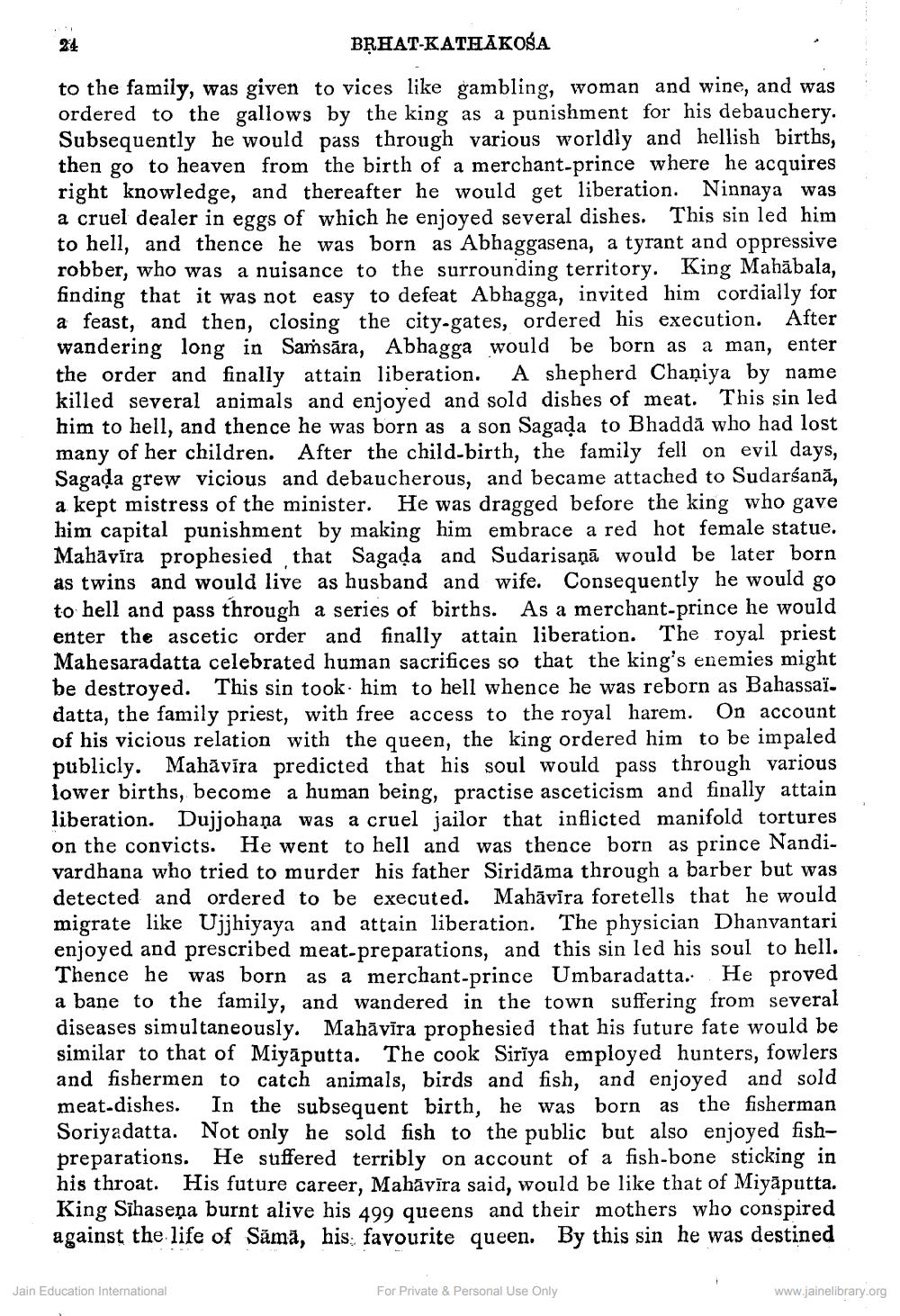________________
BREAT-KATHAKONA
to the family, was given to vices like gambling, woman and wine, and was ordered to the gallows by the king as a punishment for his debauchery. Subsequently he would pass through various worldly and hellish births, then go to heaven from the birth of a merchant-prince where he acquires right knowledge, and thereafter he would get liberation. Ninnaya was a cruel dealer in eggs of which he enjoyed several dishes. This sin led him to hell, and thence he was born as Abhaggasena, a tyrant and oppressive robber, who was a nuisance to the surrounding territory. King Mahābala, finding that it was not easy to defeat Abhagga, invited him cordially for a feast, and then, closing the city-gates, ordered his execution. After wandering long in Saṁsāra, Abhagga would be born as a man, enter the order and finally attain liberation. A shepherd Chaņiya by name killed several animals and enjoyed and sold dishes of meat. This sin led him to hell, and thence he was born as a son Sagada to Bhaddă who had lost many of her children. After the child-birth, the family fell on evil days, Sagada grew vicious and debaucherous, and became attached to Sudarsanā, a kept mistress of the minister. He was dragged before the king who gave him capital punishment by making him embrace a red hot female statue. Mahāyīra prophesied that Sagada and Sudarisaņā would be later born as twins and would live as husband and wife. Consequently he would go to hell and pass through a series of births. As a merchant-prince he would enter the ascetic order and finally attain liberation. The royal priest Mahesaradatta celebrated human sacrifices so that the king's enemies might be destroyed. This sin took him to hell whence he was reborn as Bahassaï. datta, the family priest, with free access to the royal harem. On account of his vicious relation with the queen, the king ordered him to be impaled publicly. Mahăvira predicted that his soul would pass through various lower births, become a human being, practise asceticism and finally attain liberation. Dujjohana was a cruel jailor that inflicted manifold tortures on the convicts. He went to hell and was thence born as prince Nandivardhana who tried to murder his father Siridāma through a barber but was detected and ordered to be executed. Mahāvīra foretells that he would migrate like Ujjhiyaya and attain liberation. The physician Dhanvantari enjoyed and prescribed meat-preparations, and this sin led his soul to hell. Thence he was born as a merchant-prince Umbaradatta. He proved a bane to the family, and wandered in the town suffering from several diseases simultaneously. Mahāvīra prophesied that his future fate would be similar to that of Miyāputta. The cook Sirîya employed hunters, fowlers and fishermen to catch animals, birds and fish, and enjoyed and sold meat-dishes. In the subsequent birth, he was born as the fisherman Soriy adatta. Not only he sold fish to the public but also enjoyed fishpreparations. He suffered terribly on account of a fish-bone sticking in his throat. His future career, Mahāvīra said, would be like that of Miyaputta. King Sihaseņa burnt alive his 499 queens and their mothers who conspired against the life of Sāmā, his favourite queen. By this sin he was destined
Jain Education International
For Private & Personal Use Only
www.jainelibrary.org




